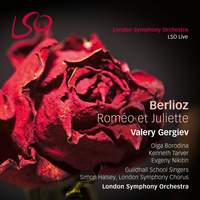Recording of the Week,
Valery Gergiev and the LSO perform Berlioz's Roméo et Juliette
I hope I won't get in too much trouble if I admit that I've always found Berlioz's Roméo et Juliette to be a slightly odd piece. Full of marvellous music, of course, but unusual in terms of its structure: although it is highly programmatic in nature, and employs a chorus and vocal soloists, it was described by Berlioz not as an oratorio but as a “Symphonie dramatique”. Indeed there are long stretches, including almost the entire second part, that are purely orchestral, and of the three soloists, two of them appear only in the first part (the tenor's sole contribution to the whole 90-minute work lasts barely three minutes!)

As one might expect from Berlioz, his orchestration is fascinatingly idiosyncratic, and this allows every section of the LSO to show off their credentials right from the start: the stormy, angst-ridden fugal opening from the strings is immensely impressive, including a great viola sound. Similarly, the trombone and tuba-dominated recitative that follows demonstrates their matchless skill: on paper it’s quite a simple line, almost always either in unison or in octaves, but the unanimity of articulation and phrasing just makes it one of many remarkable features of this performance.
Mezzo-soprano Olga Borodina makes the most of her all-too-brief contribution, a delightful aria accompanied by delicate harp and cellos. No less noteworthy are the Guildhall School Singers, who make up the Petit Choeur that Berlioz asks for during the Prologue, where their clarity, diction and intonation are all faultless. They come into their own during the tenor aria: their rapid-fire, tongue-twisting back-and-forth with Kenneth Tarver is a real delight.
The centrepiece of the work is the 18-minute Scène d'amour in Part Two, and the LSO strings play with absolutely ravishing tone here: hushed and barely audible one moment, ardently surging the next. I think it's here that Gergiev's experience in the opera house really comes into play, as he knows just how to pace a long dramatic stretch like this one. In the Queen Mab scherzo that follows (perhaps the best-known part of the work), there is virtuosity aplenty, with immaculately nimble woodwind giving way to a shimmering, alluring central section, with glowing string harmonics and pleasingly tinkly harps and antique cymbals.
It's not until the third and final part that the chorus are given anything substantial to do, but they certainly make up for their earlier absence: Juliet's Funeral Procession, with the chorus’s repeated, mournful refrain of “Jetez des fleurs pour la vierge expirée!” (“Throw flowers for the dead maiden”), is very moving. Part Three also contains some of Berlioz's most extraordinary music, not least the orchestral interlude of Romeo at the Capulets' Tomb, where Gergiev brings out every weird and wonderful touch of orchestration.
Continuing in the tradition of soloists who just pop up for a little bit out of nowhere, about fifteen minutes from the end, Friar Laurence appears, sung here with gloriously rich tone by Russian bass Evgeny Nikitin. It's not a brass-heavy work by any means, and so when Nikitin, the chorus, and the full brass section do finally let rip at the very end of the piece it's quite thrilling. Rather than an inconsolably tragic ending, Berlioz instead focuses on the combined oath from the Montagues and Capulets that they will swear to unite the two houses following the deaths of the two young lovers, and Gergiev strikes just the right note of noble optimism without spilling over into vulgarity. It makes for a refined end to a tremendous performance of an eccentrically brilliant work.
Olga Borodina (mezzo-soprano), Kenneth Tarver (tenor), Evgeny Nikitin (bass), Guildhall School Singers, London Symphony Chorus & Orchestra, Valery Gergiev
Available Formats: 2 SACDs, MP3, FLAC, Hi-Res FLAC



